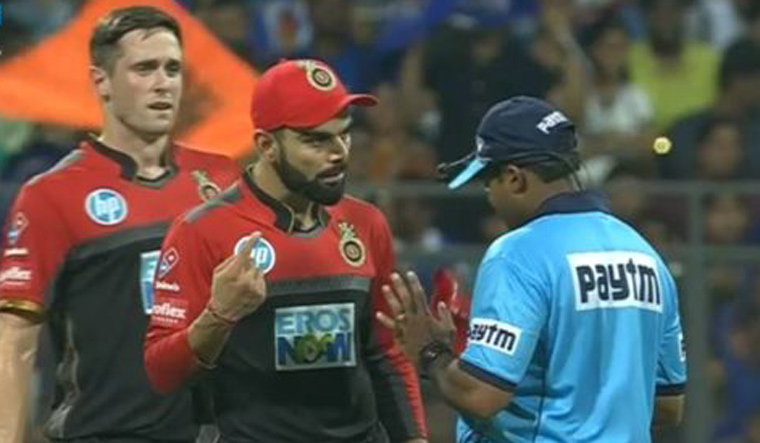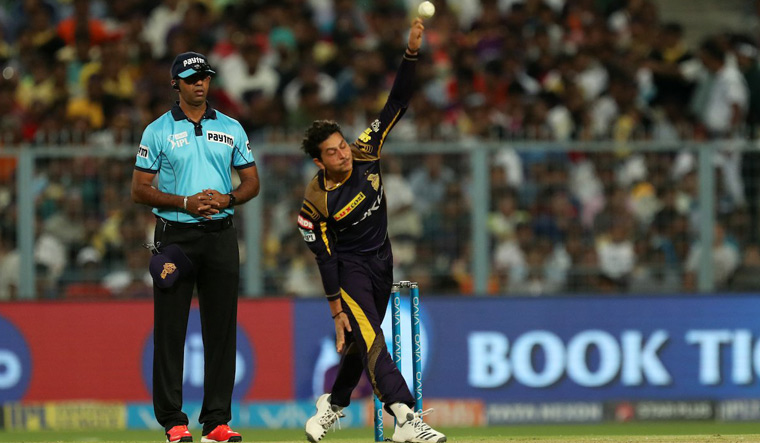To err is human, but 25 howlers in a single season of the Indian Premier League is downright unacceptable. While the batsmen and the bowlers are predominant in cricket, the umpires hold an equally integral position on the field, with each decision having a possible impact on the end-result. Even as cricketers are allowed a few slip-ups, the umpires are expected to be at the top of their game in every match. Hence, 25 mistakes, 13 of which were glaring ones, in the last edition of the league forced the Board of Control for Cricket in India (BCCI) to incorporate the DRS in this year’s IPL.
However, the usage of technology has only highlighted the poor umpiring standards on offer, and with teams having the option of referring the dubious decisions, it is the BCCI who remains stuck in a murky territory. As many as seven decisions were overturned by the DRS in just the first nine games this year, and though that has gone a long way in eradicating human follies, the underlying fact does remain that the umpiring standards in India are declining. In a bid to bring “in-house talent”, the BCCI reduced the number of foreign recruits on the panel. Though the BCCI's intentions were good in nature, the high number of misses have turned the board into a big joke.
In a major embarrassment to umpire Nigel Llong, during the game between Rajasthan Royals and Sunrisers Hyderabad this year, Ben Laughlin bowled seven deliveries in the 12th over of the game. His first three balls were bowled to Kane Williamson and the last four to Shikhar Dhawan―a blunder that was almost similar to the incident when Nitin Menon and C.K. Nandan failed to spot David Warner face the last ball of the sixth over and the first ball of the seventh in a game last year. Nandan was indirectly involved in the goof-up this time around as well, being the TV umpire who did not see the unpardonable blunder.
While a wrong decision in a Test or even a fifty-over match allows a team to recuperate, the fast-paced nature of T20s hardly allows a team to absolve the error. This is exactly what happened in Chennai Super Kings’ game against Delhi Daredevils at the MCA Stadium in Pune, when Trent Boult bowled a lethal in-swinger to Shane Watson early on in the innings. The delivery nipped in to strike Watson in the pads but the on-field umpire dismissed it as not out. The Shreyas Iyer-led Delhi side went up in review but after the TV umpire replayed the incident umpteen times, the call of the on-field umpires stuck, much to the amusement of all around. After a miraculous survival, Watson romped home to 78 in just 40 deliveries, helping Chennai Super Kings win by 13 runs.
Iyer was hardly impressed at the proceedings and aired his opinions in the post-match presentation ceremony. “The way Watson started, it totally changed the game. Not only me, the whole dressing room and, obviously, you also think the same―that ball hit the pad first and then the bat.”
 (Screengrab) RCB captain Virat Kohli got into an argument with an umpire over a decision during their match against Mumbai Indians
(Screengrab) RCB captain Virat Kohli got into an argument with an umpire over a decision during their match against Mumbai Indians
A number of errors with the no-ball too have panned out and with the no-ball being accompanied by a free-hit, chances of a momentum-shift are high. Kolkata’s Tom Curran was declared to have bowled a no-ball against Mumbai Indians at Eden Gardens, when half his foot was behind the crease. Kings XI Punjab’s Andrew Tye had to bear the brunt of a free-hit against the Knight Riders even though he had not overstepped. Umpire Vineet Kulkarni was at the end of the ire from Sunrisers Hyderabad fans when he refused to account a Shardul Thakur delivery that was clearly above the waist of batsman Kane Williamson as a no-ball. Sunrisers Hyderabad lost a close game, which led to cries over the TV umpires having the liberty to call out no-balls as well.
However, it is not that the third umpires have escaped the limelight either. Mumbai Indians’ Hardik Pandya was given a reprieve after a clear edge on the snickometer escaped the TV umpire’s sight. In yet another bizarre incident in the same game, the umpire failed to spot a wrong video replay that had been provided by the broadcasters after Umesh Yadav’s dismissal. Jasprit Bumrah had Umesh dismissed after he miscued a shot to Rohit Sharma but the on-field umpires immediately asked for a verification of the no-ball. The replays that were shown had Umesh at the non-striker's end and not on the batting side! With Bumrah’s landing foot in that replay well within the popping crease, the batsman was given out.
These spate of incidents forced IPL chairman Rajiv Shukla to issue a statement, wherein the umpires have been encouraged to turn to technology in case of any doubt. “The match referees are told to speak to the umpires to take help of technology in case of a doubt.”
But is the BCCI following the right procedure in picking out umpires for the IPL? Instead of ensuring that the top-tiered umpires (who are paid INR 20,000 a day) feature in the league, the BCCI has been keen to distribute the matches even amongst the lower-rung umpires that earn INR 15,000 a day. Sometimes, in order to accommodate umpires from every zone, the BCCI incorporates officials without being aware of the standards in that particular zone. Reports have also emerged that even if a few individuals have failed to get the required medical parameters in vision and hearing, they have been given the nod for personal benefits.
Whether the BCCI is really keen to do away the increasing trend of bad decisions, however, is up for debate. The services of Simon Taufel, regarded one of the best umpires in the world, was done away with after he had been asked to supervise the Indian umpires in 2016. The Indian board would earlier ask the domestic teams about the standard of umpiring in their respective matches but this move too died a gradual death. With no first-hand information on the quality of the umpires, the administrators are often in the loop, only to be found out when the biggest T20 extravaganza takes place.
In order to avoid such misgivings, it is imperative that a proper framework is set in place, else the standards of the Indian umpires are expected to plummet even further.



![[File] Simon Taufel is regarded one of the best umpires | AFP [File] Simon Taufel is regarded one of the best umpires | AFP](https://img.theweek.in/content/dam/week/news/sports/images/2018/5/19/simon-taufel-file-afp.jpg)